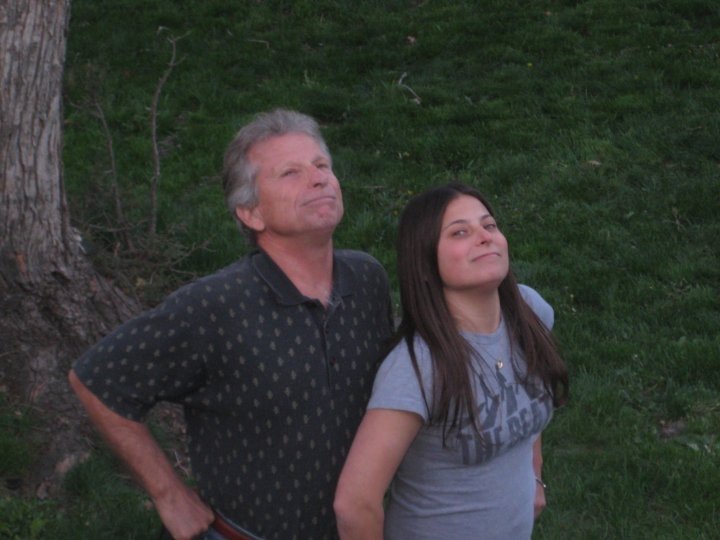5 Tips on How to Improve a Relationship (Like Mine With My Dad)
Here I’ll walk you through how I healed my relationship with my dad before sharing 5 tips that should work for just about anyone! If you would rather skip to those, feel free.
My healing journey kicked into high gear when I moved in with my parents in my 30’s.
I moved from Houston to SoCal for a new job on March 14, 2020. I was pumped about the shared Airbnb I’d booked for my first month, just two blocks from my new office. Two days later I was namaste-ing my new team when they told us to grab our things and start working from home. I lasted two high anxiety days before begging my parents to let me move in with them. The begging wasn’t necessary. They welcomed me into their home a couple of hours away, for what we expected to be a two-week stay.
Shutdown hiking buddies! (San Diego, CA, 2020)
Being home with my parents was great at first. My anxiety about their health dropped significantly once I was able to police their actions in person. I’d do the shopping, and they’d help sanitize the groceries when I got home. (Yeah, I do now realize how ridiculous all that sounds.)
As the days stretched into weeks it got more difficult. My dad loves the news, even though he hates what they have to say. When he gets riled up (not an uncommon event) his voice gets loud and angry (it’s not yelling, he swears) as he shares his opinion with everyone in the room. Including the newscasters on the other end of the screen.
I had spent the last few years cultivating a sense of calm and peace, and this disrupted that peace.
My dad, like me, wants what is best for other people. More often than not, though, we seem to have different ideas about what IS best for other people. Even when we do agree, the way he *passionately expresses* his opinion looks like what many people would call arguing. While he is open-minded and looks at things from different angles, it doesn’t feel like that when you’re talking to him.
Meanwhile, I’m SO aware that I don’t know what’s best that I’m always looking for holes in theories. And I’m a perpetual optimist, always looking for what is right about a situation. A stark contrast to my dad’s strategy of looking for what’s wrong with it so he can fix it.
My tendency in 2020 was to verbalize those thoughts. At the time I didn’t realize that this meant that whoever I was talking to would feel like I was always arguing with them. It’s almost like I’m a little like my dad.
Celebrating our beer pong victory at my college graduation party (Boulder, CO, 2010)
Oh how I wish I could tell you this photo was staged (somewhere in New Zealand, 2014)
My parents’ home has a pretty sweet setup. My room and makeshift office were on the bottom level, and their living space is upstairs. Every time I approached the bottom step, I would brace for what felt like a fight. And, surprise! That’s the vibe I’d get when I got upstairs. Of course I did.
When we’re braced for something, we tend to experience it. Whether or not it actually happens. I didn’t know that back then.
(I do want to pause to acknowledge that I’ve always understood that I was extremely fortunate that my parents took me in. I’m grateful that I had them to interact with. I also know that my parents are way more loving, kind, and supportive than most. I really valued and appreciated all this. And I was also experiencing a whole lot of frustration, pretty much every evening.)
2 or so months into my new roommate situation I discovered the work of Tara Brach (a meditation teacher, psychologist, author, and speaker). During one of my obsessive walks around the neighborhood (a pandemic wasn’t going to stop me from getting my steps in!) one of her talks stopped me in my tracks. My problem wasn’t my dad’s behavior, it was something going on inside of me! I started gobbling up her talks, hoping to get to the root of it.
A couple of days later I was listening to one of her talks about blame when it hit me. Blame was what I had been feeling toward my dad!!!
I didn’t understand why, but that was the energy behind the emotion… So I thought. I pulled up one of Tara Brach’s guided RAIN (Recognize, Allow, Investigate, Nurture) meditations to help me dive deeper. Allowing the blame to exist allowed me to see what was underneath: fear.
I was afraid that I would never find a place where I truly belonged.
That was a heavy realization for me. Ever since I went away to college I’d had big groups of friends. I had no trouble socializing with strangers. But it hit me then that it rarely felt like those people wanted to be hanging out with me. I never felt like I truly belonged in any of those places. The tension with my dad was just a distraction from something that was really hard to admit.
When I went up the stairs to join my family for dinner that night I wasn’t braced to fight and, wouldn’t you know it, I didn’t need to be.
Living at my parent’s house didn’t become a magical, blissful experience at that moment. It did, however, get much more enjoyable. Back then I didn’t have the tools or knowledge to release trapped emotions for good, the way I do now. So I’d get triggered, put on a RAIN meditation, and be with the emotions that were there. They’d subside and I’d feel better until I’d get triggered again and repeat the process. This felt a lot better than keeping the emotions bottled up inside. (It’s also worth noting that I was seeing a virtual therapist weekly during that time, which was very supportive.)
I was also growing more compassionate, thanks to Tara Brach’s free weekly lectures and the discussion groups after. (These are still going on btw!) I began to see my parents differently - as people who just want safety and security for their families and for the rest of the world too (on the occasions they could coexist).
Simultaneously, I was learning about the power of listening from Thich Nhat Hanh’s books and lectures and the sangha I practiced with weekly. I discovered that by listening more and talking less when he was upset, we both had a better experience. It didn’t feel like we were arguing all the time.
*Not my dad. Who did approve this article, btw
My experience went up another notch when someone suggested visualizing parents as toddlers.
We all have scared, frustrated, hungry little toddlers inside of us, after all. Little toddlers who just want to make sure they’re going to get fed and have a safe place to sleep. And how can you be mad at a toddler shaking his fists at the tv? It’s actually kind of adorable. Or ridiculous, if you picture them in a diaper. I don’t recommend going that far.
Next time you have to deal with a frustrated adult, try it out. Pretend they’re a big toddler throwing a temper tantrum, and let me know how it feels. This is also a great practice to use on yourself. After all, often we really do just need a snack or a nap.
All this work demonstrated itself beautifully on one of our last days as roommates.
I had convinced my parents that we should watch When They See Us. It's a Netflix series about the 5 black kids wrongly accused and sentenced for a rape they didn’t commit in Central Park in 1989. My dad was expressing his frustration with the series because it was “obviously exaggerated” in his usual loud, angry way. It “must have been making the prosecutors and detectives look worse than they were, because no one could do what they did”.
Normally my strategy would have been to argue; to tell him how ignorant he was and that his privilege blinded him. I’d also add a bunch of other stuff that would have no value; it would shut him down and put up a wall between us. There’s 0% chance he’d finish the series with me. This time, though, I saw what was actually happening and I verbalized it without thinking.
“You just always want to see the best in people, so it’s hard for you to imagine that they could do something like this, right?”
“Well yeah, I guess so,” he said.
“I see that. It is really hard to imagine. But history has shown that it has happened on multiple occasions so we might as well learn about it... is that ok?”
And together we finished the series without the tension between us.
When my parents and I parted ways a few days later, I was sad to say “goodbye for now”. Our relationships have been growing ever since.
Are you ready to improve any of the relationships in your life? Here are 5 tips to do that with ease!
5 tips on how to improve a relationship :
Set boundaries for how you want to interact and for what you do and don’t want to talk about.
Make sure to communicate these boundaries. It is much easier to draw a line and end a conversation if they knew you weren’t willing to go there in the first place.
Before you interact, shift your energy so you’re looking forward to seeing them.
Loving-kindness meditation is amazing for this. If you’re braced for a negative interaction it’s highly likely that you'll get one.
Focus on what you have in common.
When you catch yourself thinking negatively about the other person, pause and think of 2 ways in which you’re similar. Simple things like “just like me, they want to know they’ll always have a bed to sleep in, too.”
Get curious!!
Seek to understand them when you do interact. Their viewpoints may be very wrong, but you probably can’t change that. Instead of trying to convince them they’re wrong, think of it as a mystery you’re trying to solve. What makes them think the way they do? (Note: if a subject does come up that you highly disagree on, it may be a good time to implement tip #1. Set your boundary and change the subject.)
If they do get frustrated and start behaving ridiculously, picture them as a giant, cranky toddler.
Keep in mind tip #1. If they aren’t a kid there is a good chance you can choose to walk away!
Do you want support transforming the relationships in your life? That’s kinda my jam. Learn more about how I work with people as a transformational life coach.




